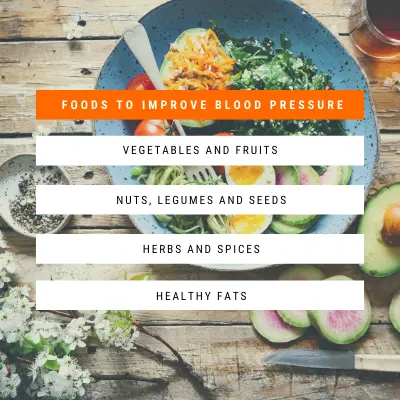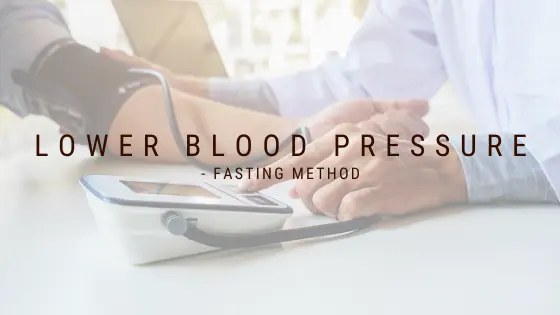Heart disease is one of the leading causes of death worldwide, and high blood pressure is the biggest indicator of increased risk for heart attack or stroke. Whether you’re already concerned about your blood pressure or you simply want to improve your outlook on life for the foreseeable future, fasting is a free, easy and simple way to manage your blood pressure.
How Does Intermittent Fasting Lower Blood Pressure?
Before we talk about how fasting affects your blood pressure, it’s important that we understand what our numbers mean. You may know that a normal blood pressure is 120/80, and the higher your numbers go from there, the higher your risk of heart disease becomes. But what does 120 mean? What does the 80 stand for?
The first number is your systolic rate, which is how much pressure is placed on your arteries when your heart contracts. The second number, the diastolic rate, is the pressure when your heart relaxes. The higher the numbers, the more hardened your arteries are and the more difficult it is for your heart to pump blood throughout your body. This is called hypertension. These numbers should vary throughout your day but if your blood pressure is consistently high, you run the risk of damaging your blood vessels throughout your entire body.
Digestion and Blood Pressure
When you eat, your body will begin to pump more blood to the systems and organs that manage your digestion, primarily your stomach and small intestine. Digestion is one of the biggest jobs your body has to conquer, so it takes quite a bit of work. This naturally results in a fluctuation in blood pressure which, in a healthy body, is not only normal, but crucial for your survival.
In a body that has chronically elevated blood pressure, it may mean that your heart can’t handle the extra pressure. It makes sense then, that if you don’t eat for a while, your body won’t need the added blood flow and you’ll give your blood pressure a chance to normalize.
Intermittent fasting has been shown to reduce inflammation and plaque build up in your arteries, allowing your heart to more effectively move blood throughout your body. It also allows your body to access stored glucose from your fat cells to burn as fuel, which contributes to a number of positive results: weight loss, lower total cholesterol levels, reduced triglycerides and improved insulin management.
Fasting and Blood Pressure – Questions and Concerns
After years of misinformation about the importance of frequent, small meals, a lot of people are understandably scared of fasting. Not surprisingly, there’s also a lot of fear surrounding the topic of heart disease. To put your mind at ease, we’ve addressed the top 3 concerns related to fasting and blood pressure.
1. Can hunger cause high blood pressure?
If you don’t eat, you will get hungry, which is stressful. Isn’t stress a contributor to high blood pressure? Yes, however, as with most things in health, there is good stress and bad stress. Good stress triggers survival mechanisms in your body that will not only keep you alive, but will help keep you in optimal health. When you get hungry, the stress response tells your body to release cholesterol which allows you to more effectively burn fat for energy, rather than glucose. This will not just decrease your risk for heart disease but it increases your overall health in countless other ways.
2. Fasting while on blood pressure medication
If you are on any medications, it’s absolutely imperative that you discuss any changes to your normal routine with your medical professional. Fasting can and likely will lower your blood pressure, so if you’re on medications for this, you may end up lowering your blood pressure too much or too quickly. There are ways to adapt your fast and/or medication to make the most of a natural treatment protocol, but always consult your doctor.
3. Are there negative effects of fasting on blood pressure?
The one potential side effect of fasting on blood pressure is that it can unbalance your electrolyte levels, increasing your chances of arrhythmia. This is more likely to happen on long-term fasts, which should always be supervised and therefore any imbalance can be caught before it becomes dangerous.
Fasting is not always a good idea for the rapidly growing bodies of children, teenagers or pregnant and breast-feeding mothers. If you have type 1 diabetes or an eating disorder, it may also have negative consequences for your health.
Foods to Include
Certain nutrients can help you quickly and naturally reduce your blood pressure.
Vitamin D3 and Vitamin K2 both help your body to regulate calcium, stopping it from building up in your arteries and directing it to your bones instead. Potassium calms and relaxes your nervous system, and magnesium helps to relax your blood vessels and decrease tension in your muscles, both of which help to lower blood pressure. They’re also key players in how your body retains an ideal fluid balance.
To get these vitamins and minerals and many more that will help you naturally improve your blood pressure and overall health, you want to be eating plenty of whole foods:
- Vegetables and fruits
- Nuts, Legumes and seeds
- Herbs and spices
- Healthy fats, particularly from high quality, wild-caught fatty fish like salmon, olives, avocados, flax and chia seeds

Foods to Avoid
One of the first treatments for high blood pressure is diuretics, so you want to avoid consuming foods that are going to cause you to retain fluids as this puts pressure on your heart. Processed and refined carbohydrates tend to hold a lot of water and will elevate your blood pressure because of this alone. This is also the reason salt has developed such a dangerous reputation.
Chronically elevated insulin levels are also correlated to high blood pressure, so managing your blood sugar is crucial for managing your blood pressure. Fasting is a very efficient way to reverse insulin resistance as well, so you’re likely to benefit both conditions at the same time.
The American Heart Association has been recommending the DASH Diet for many years, which encourages you to lower salt and fat intake. Your body needs salt and fat to thrive, however, so it’s much more important to regulate the quality of your fat sources. Eliminating processed, fried foods will absolutely have a positive affect on your blood pressure, but that doesn’t mean that you should avoid healthy fats and essential electrolytes.
If blood pressure is a concern, you’ll also want to be very careful about your consumption of alcohol. Small quantities of red wine or beer can lower your blood pressure but drinking excessively or consistently over a long period of time can increase it. It can also contribute to liver disorders and weight gain, both risk factors for heart disease.
Fasting to Lower Blood Pressure
High blood pressure is simply one component of a metabolic disease that can be controlled extremely effectively using a nutritious diet and periodic fasting.
- If you can heal your metabolic system, you will drastically reduce your risk for heart disease
- Fasting can help your natural biological system reset so that it can perform the way it was designed to and keep you healthy long-term
- What you eat and when you eat are both important factors in lowering your blood pressure
Blood pressure isn’t the only contributing factor to heart disease. Cholesterol, insulin management and diabetes and weight can also increase your risk. Interestingly, all of these factors can be improved through the easy, free and completely accessible practice of fasting. To learn more about how fasting can improve your health in so many ways, check out our related post, Is Fasting Healthy.




